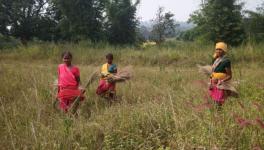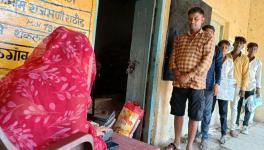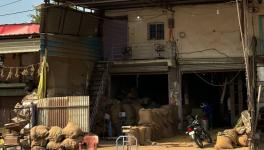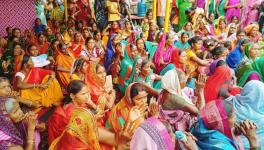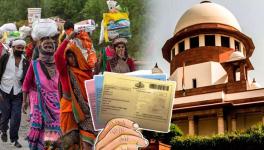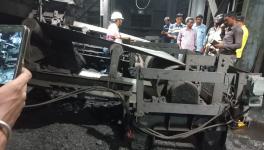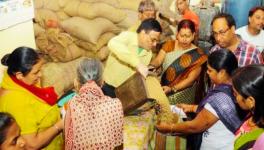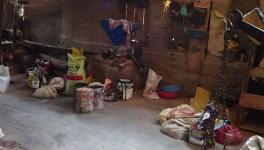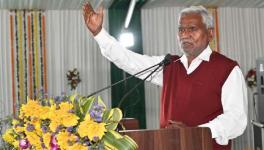Jharkhand: A Timely Reality Check on Implementation of Food Security Act
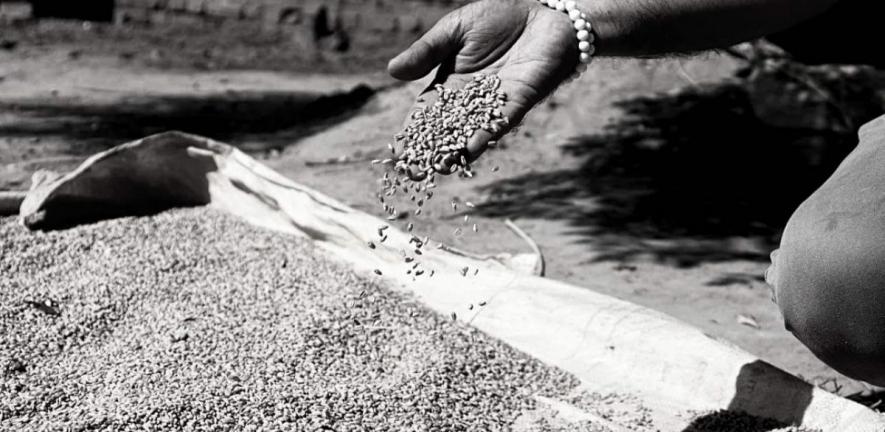
The author takes stock of the implementation of the National Food Security Act in Wards 34 and 49 of Ranchi district in Jharkhand. This report focuses primarily on four major schemes under the Act: the Pradhan Mantri Matru Vandana Yojana, the Public Distribution System, the Mid-Day Meal Scheme, and the Integrated Child Development Scheme. Her recent pilot study in the two wards not only reveals the shortcomings of the schemes, but also incorporates the perspectives of the various stakeholders and gives recommendations for fruitful changes in them.
—
Rajani Munda is a 29-year-old woman residing in Bajra, which falls in Ward 34 of the Ranchi district of Jharkhand. She is expecting her first child and has enrolled herself under the Pradhan Mantri Matru Vandana Yojana (PMMVY), which is a flagship programme of the Union government under the National Food Security Act, 2013 (NFSA).
According to Section 4(b) of the NFSA, all pregnant and lactating women (after January 1, 2017) registered at the anganwadi centre shall be entitled to an amount of six thousand rupees, which shall be given to her in four instalments that shall begin from the inception of a woman’s pregnancy till the time her child reaches six months of age. The money is transferred in the bank account through means of ‘Direct Benefit Transfer’.
Despite being enrolled under the scheme, Munda, who is three months pregnant, is yet to receive her first instalment of one thousand rupees. The reason: There was a spelling mistake in her name, as stated in her Aadhaar card. The actual spelling of the beneficiary’s name is ‘Rajani’, but in the Aadhar card, it was spelled ‘Rajni’.
A closer look at the correction queue would show that these errors are common and recurring. Such errors in the names of beneficiaries have caused delays in the process of getting maternity benefits.
Yashmin Khatoon is a 57-year-old woman residing in Gaush Nagar of the Ranchi district. Every month, she and her neighbours, residing near the airport, have to walk two kilometres to Saket Nagar (Ward 49), where her current Public Distribution System (PDS) centre is situated, to collect ration. She demanded that a PDS dealership be given to her in Gaush Nagar itself so that people of her locality could be saved from the ordeal of commuting such a long distance each month. All her neighbours concurred with her demand.
The Rajkeey Madya Vidyalaya is located in Bajra in the Ranchi district. According to the passbook of Saraswati Vahini, the coordinator for the Mid-Day Meal (MDM) scheme under the NFSA, who is assisted by a team of four, the fund for the MDM scheme is always received late. In such conditions, Vahini purchases rations from the local shop on credit. When the fund is released by the government, it is paid to the shopkeepers.
Despite being enrolled under the scheme, Munda, who is three months pregnant, is yet to receive her first instalment of one thousand rupees. The reason is that there is a spelling mistake in her name, as stated in her Aadhaar card.
The above three cases reveal the status of the implementation in Ranchi of the NFSA, which aims to provide food and nutritional security as per the human life cycle approach by ensuring access to adequate quantities of good quality food at affordable prices to people so that they can live a life of dignity. In order to fulfil this objective, it primarily focuses on four major schemes of the Union government: MDM, the PDS, the Integrated Child Development Scheme (ICDS), and the PMMVY. All these schemes have been devised to provide minimum food security to beneficiaries.
A study was recently conducted by the author to gain insight into the implementation of these food security schemes in Wards 34 and 49 of Ranchi district by means of qualitative data. The study not only highlighted the lacunae in the current system of implementation, but also suggests possible solutions, which have been gathered after incorporating the opinion of stakeholders such as anganwadi helpers (ANHs) and supervisors, school principals, PDS dealers, ward commissioners and beneficiaries of the schemes.
PMMVY
The Aadhar card or the unique identification number (UID) serves as the unique identification proof in availing these schemes. According to the guidelines of the PMMVY, the Aadhar card of the beneficiary and her husband are mandatory to seek benefits under the scheme. Forms 1-A, 1-B and 1-C, which are the prescribed forms for the first instalment, second instalment and third instalment respectively, clearly require the beneficiary to mention her Aadhar number and submit the photocopy of the Aadhar card supporting it. However, from interviews with beneficiaries and other stakeholders, it emerged that Aadhar card discrepancies are one of the major reasons for non-payment of the maternity benefit.
There were cases where the husband’s name did not match the name mentioned in the Aadhar card. There were many cases where the UID was shown as invalid or suspended. The major reasons that emerged for invalid UID were that they had not been used for more than three years, or that they had not been linked to a beneficiaries Permanent Account Number (PAN) or bank account. Another reason for invalid Aadhar was that some beneficiaries had two Aadhar cards, one of which got cancelled, but they weren’t aware which Aadhar number was valid.
The seeding of one’s Aadhar card and one’s bank account is mandatory, as per the PMMVY guidelines. Each beneficiary has to provide details of the particular bank account linked with the Aadhar card. No other account is accepted. Several beneficiaries were not aware that they have to provide the bank account number of Aadhar-linked accounts. Due to this, they didn’t receive the maternity benefit as their name went to the correction queue.
Invalid, dormant or inactive accounts
There are several reasons behind bank accounts becoming invalid. An error occurs either because of an incorrect account number being given by the ANH, or such account numbers being provided by the beneficiaries that are blocked, closed or inactive. In some cases, the bank accounts showed no transactions for more than a year.
There were several cases of accounts being rejected by the bank. Some accounts are closed or have been transferred. The Indian Financial System Code (IFSC) of some other beneficiaries is not present at the bank branch or is currently inactive at the bank branch.
Software problems
There is provision to look at the total beneficiaries list per anganwadi centre, but there is no provision to see the details of the instalments received. For knowing whether the beneficiary has received the first, second or third instalment, the supervisor has to click on individual names of the beneficiaries in the software in order to know such details.
The emphasis on the husband’s Aadhar card has left out single mothers from the list of eligible beneficiaries.
Anganwadi supervisors are yet to be trained on working with the software and using the tablets that were given to them by the government without any formal training to operate them. They have had to learn to operate them on their own.
Sayukta Kumari, a supervisor in Ward 34, said that several teams from Delhi had come to collect feedback on the software. Anomalies were pointed out to them, but no changes have been made. For smooth functioning of the system, regular upgrades of the software are necessary.
Negligence of the implementing authorities
The lack of coordination among the implementing authorities at some places was also found to be the reason behind many beneficiaries being left out from availing maternity benefit. It was found that at some places, wrong information or improper information is given to the beneficiaries by anganwadi workers (ANW), as they themselves are not clear on the scheme and its conditionality.
Any corrections made in the beneficiary details should be immediately communicated to the ANWs. Since this is not done promptly, it causes further delay in payment, and beneficiaries do not come to know of the reason for not receiving the cash benefit.
Gaps on the part of beneficiaries
Many beneficiaries told us that corrections were not made despite being communicated to the ANWs. A major reason behind this is that Aadhar correction camps are located at far away destinations. Some beneficiaries felt it was too much of a task to undertake traversing that distance for a small amount. Many of them said that they are not able to visit a Pragya Kendra or an Aadhar card correction centre because of having small children to constantly tend to.
Many beneficiaries don’t know that their passbook has to be updated to know if the payment has been received or not. They reported not receiving the payment, being unaware of the payment being received in their bank account, and being unaware as to which bank account they were receiving the payment in since they have multiple accounts. Clarity regarding this sort of information ought to be given to the beneficiaries.
Since most of the beneficiaries are homemakers, they don’t have any fixed income coming into their account. Their bank account remains unused. Some of them have accounts only for the purpose of the scheme. Unused accounts become dormant after three to six months of inactivity.
It was also found in some cases that wrong accounts that are not Aadhar linked/seeded were being furnished by beneficiaries.
Flaws at the level of policy-making
The emphasis on the husband’s Aadhar card has left out single mothers from the list of eligible beneficiaries. Although no such case came to light during the survey, it is possible that such cases were not reported because they know that the husband’s Aadhar card is mandatory.
There is also a confusion with regards to if the husband remarries, whether the second wife could avail the scheme if his previous wife has already claimed PMMVY.
The husband’s Aadhar card is a mandatory document as per the PMMVY guidelines. If there is any error or re-entry of the husband’s name, there is a possibility that the software would not accept such a double entry. These cases have to be further investigated for clarity if such situations are possible so that eligible beneficiaries are not left out from the scheme.
Aadhar should be made optional under the PMMVY
The UID/Aadhar is an important document. It serves as a unique identification card. It may not be removed as an eligibility criterion, but the requirement of the husband’s Aadhar card should be secondary or optional to avail maternity benefits. It should not be mandatory.
Aadhar correction camps should be held at anganwadi centres on a fortnightly or monthly basis for pregnant and lactating mothers to easily access their services and get their Aadhar updated in case of any error.
Aadhar correction camps should be held at the anganwadi centre on a fortnightly or monthly basis for pregnant and lactating mothers to easily access their services and get their Aadhar updated in case of any error. Monthly meetings of the ANW/ANH and the lady supervisor/child development project officer should be held. The supervisor has to mandatorily inform the ANWs regarding the correction required and the payment status of the beneficiary registered under her. Small pamphlets could be distributed to the anganwadi centre for the ANW/ANH and beneficiaries, with all the details and conditions of the scheme to raise awareness regarding the scheme.
PDS
Another component of the NFSA is the PDS. The PDS ensures that every beneficiary household receives a minimum quantity of food grains at subsidised rates.
Our study revealed discrepancy in the amount of food grains weighed and those actually given.
Most of the beneficiaries interviewed said that there was always a difference of one to two kilograms in the quantities they were supposed to get and the quantity they actually received. A beneficiary, on condition of anonymity, revealed that her PDS dealer gives her one kilogram less than what she is entitled to every month. Whenever she asks for the exact quantity, she is told that one kilogram is siphoned off from each beneficiary’s share, which is later on given to the mahila samiti, that is, a self-help group of women. She keeps quiet because she fears that she might be harassed the next time she comes to collect her share of ration.
Distance as an impediment for beneficiaries
Mazayir Mohammad is a septuagenarian handicapped man residing in Manitola of the Ranchi district, which is in Ward 49. There are three members in his family. Though a resident of Ward 49, his card was transferred to Harratand, which is in Ward 50.
He says that although his current dealer is gentle to him, he wants to get his card transferred back to Ward 49 as it is situated at a far-off distance, and going there every month is a herculean task for him.
E-posh: Not a fool proof method of acknowledgement
Most beneficiaries said that the previous method of putting signature was a better method of acknowledging the receipt of ration than the current one of doing so electronically. They said that unscrupulous PDS dealers coerce them to give their thumb impression without giving them the ration they are entitled too. This helps them to give a false impression that the allocated ration has been distributed among the beneficiaries.
Erroneous system of electronic login
However, the perspective of the ration dealers was different.
Khurshid Haidar, a PDS dealer in Manitola in Ward 49, says that whenever a beneficiary has to be given ration, the PDS dealer has to electronically login their shop, which is connected to the department’s server. As soon as the dealer proceeds to connect, they have to give their consent to the government’s terms and conditions under compulsion as there is no option of negation in the machine. This, he says, is coercion on the PDS dealers like him who do not agree with the stated terms.
In the same way, the ‘e-posh’ system is a huge hurdle to ageing beneficiaries whose thumb impressions are not accepted. “Agreed that any of their family members can give their thumb impression, but what about single-member families?” he questions. He said that he was being given 32 cards of leprosy patients which he did not accept as he knew that the beneficiaries’ thumb impressions would not be taken and he alone would be blamed for it.
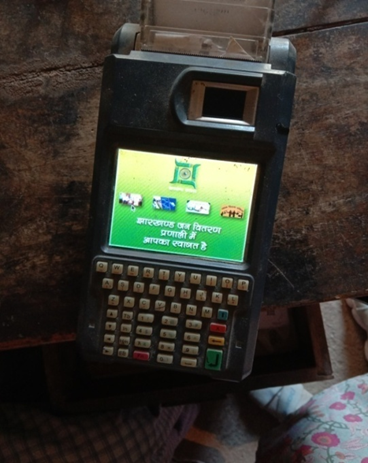
Machine given to PDS dealers
Inclusion of the weight of the jute sack
Chandrashekhar Singh, a PDS dealer of Ward 34, says that the weight of the jute sack which contains food grains, is included in the total weight of grains that he gets from the godown. The weight per sack is roughly 650 grams.
Suppose a dealer receives 6,305 kg rice for his ‘Priority Household’ cardholders, and 3,010 kg rice for his Antyodaya Anna Yojana (AAY) cardholders in jute sacks of 50 kg each. This means that they would get a total of 9,315 kg in around 186 sacks. Hence, the quantity of rice that the dealer receives is less by some 120 kg.
Most of the PDS beneficiaries interviewed said that there was always a difference of one to two kilograms in the quantities they were supposed to get and those they actually received.
Further, he said that there is an anomaly with regard to the quantity measured of stocks which come to them from the godowns. The quantity is noted as soon as the sacks are thrown with thrust on the machine, which reduces when the needle becomes stable. He also mentioned that every time he received the stock from the godown, he had to bribe the officials to the tune of around ₹20 per quintal.
Weight of food grains taken along with the sack
A monetarily non-rewarding job
L.N. Sahu, a PDS dealer in Ward 49, said that no honorarium is given to PDS dealers. They are just given a commission of ₹1 per kilogram, that is, around ₹2,500 for the 2,500 kilograms of food grains they distribute among beneficiaries each month.
From this small amount of money they receive, they have to pay the rent of the shop, purchase stationery, keep an assistant, and also pay for electricity charges. On being probed as to what attracts one to have a PDS dealership, he said that people are under a false impression that PDS dealers earn lucratively.
Impediments at the operational level
PDS dealers revealed that there is no provision to deal with shortage of food grains. The shortage is compensated only by oil.
Many beneficiaries do not have access to mobile phones for electronically registering their grievances or knowing about other developments. They also said that the one-time password is not received by them on several occasions when they start their machines to give away food grains to the beneficiaries, due to the government’s failure to pay for such service charges.
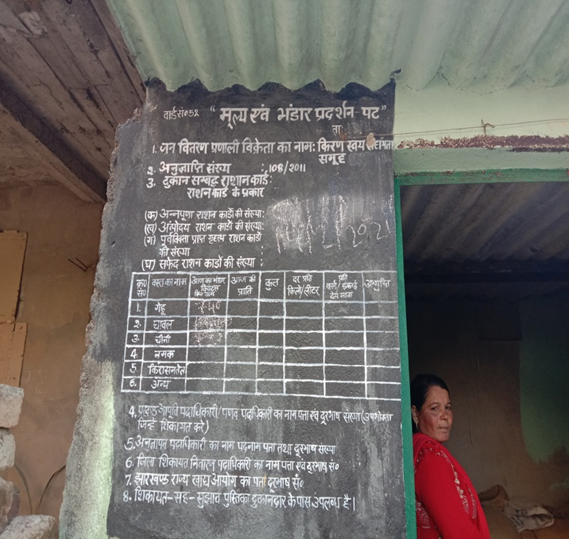
Display board put up in front of a PDS shop in Ward 49 of Manitola, where the daily distribution of food grains has to be displayed for the information of officials.
Many officials, on condition of anonymity, revealed that the main problem with the PDS is that a lot of ineligible households and persons have ration cards. These ration cards are given on the basis of the 2011 census, and Jharkhand has already achieved some 65 percent coverage under the PDS when the maximum limit is around 75 percent. Hence, they are now controlling the total number of new cards that are being made. The extra 10 percent is kept like a buffer to make new cards for those in dire need.
Many officials, on condition of anonymity, revealed that the main problem with the PDS is that a lot of ineligible households/persons have ration cards.
According to these officials, the post of the monitoring officer needs to be strengthened as they are the sole authority when it comes to inspection, which is a humongous task. They also lack manpower to conduct such inspections.
Above all, the vigilance committee, whose task is to keep a watch on any kind of irregularity, is non-functional in Jharkhand. Jamila Khatoon, ward commissioner of Ward 49, said that once, stickers depicting their ‘poor’ status were stuck on the doors of deserving beneficiaries. Activists in the locality protested that to label the financially weak as ‘poor’ is against human rights.
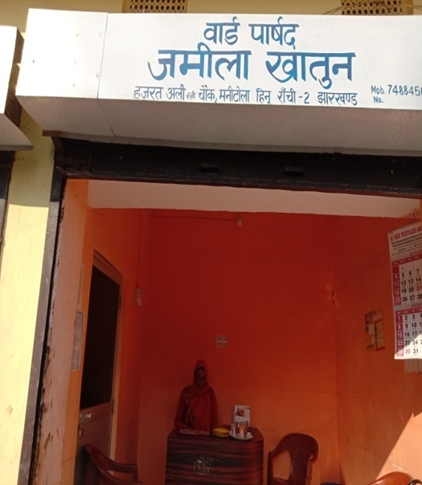
Office of the ward councillor of Ward 49 in Manitola area of Ranchi district
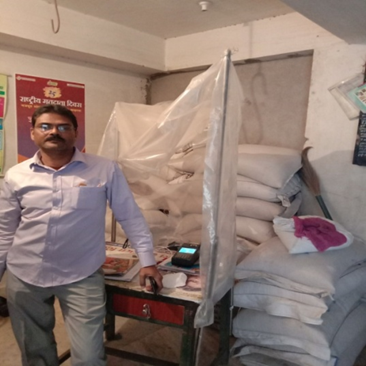
PDS shop of L.N. Sahu in Ward 49
Note: It was observed during the survey that PDS dealers became extra-conscious during the period. If a PDS dealer was interviewed in one corner of the ward, all PDS dealers in the vicinity came along and tried defending the dealer who was being probed.
Ward commissioners revealed that in Ward 49, one PDS dealer ran four to five PDS shops. Although each shop was allotted to a different person, they were owners of the shops in name only. The operations of all PDS shops was managed by a single dealer who unofficially collected commission from others. In Ward 34, which falls in the Hehal area of the capital, the PDS shop of Arun Oraon is run in a small corner of the garage by an agent (Subodh Kumar) appointed by him.
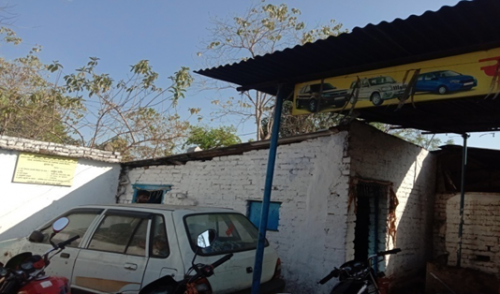
PDS shop of Arun Oraon in Ward 34 is situated in a garage
A system must be devised to receive the manual receipts of the beneficiaries which could then be verified on phone by the authorities. Inspection must be done to see that at least the most urgent requests for new ration cards are catered to with immediate effect. Ration dealers must be regularly made accountable to the local vigilance committee.
MDM
The MDM scheme, which has now been renamed as Pradhan Mantri Poshan Shakti Nirman (POSHAN) scheme, is designed to improve the nutritional standard of school-age children nationwide. The programme supplies free lunches on working days to children in government primary and upper-primary schools, government-aided anganwadis, madarsas and maqtabs.
MDM benefits a large number of people but it should be outsourced to a private organisation that can bring readymade packets of cooked food to school. This will save the hassle of cooking at the school.
The author conducted a survey to determine the status of the scheme in Madhya Vidyalaya, Bajra, which is situated in Ward 34 of Ranchi district.
Campus of Rajkeey Madhya Vidyalaya, Bajra in Ward 34
According to the MDM register maintained at the school, hot cooked meals were served to children on a regular basis. The principal said that during the pandemic, food grains and vegetables in proportion to one square meal were being given to children in lieu of the hot cooked meal they are entitled to. The ration was made available to them in their villages. That their share was ready for distribution was communicated to the children’s families through SMS. For families of students who did not have mobile phones, the information was spread through word of mouth.
School teachers are involved in supervising the cooking process. They are also involved in looking after the seating arrangement of students while they have their meals. This proves as a digression from their primary work of teaching.
According to Praveen Lakra, the acting principal of Rajkeey Madhya Vidyalaya, Bajra, the salary of MDM workers is not enough. The passbook of a worker revealed that he never received his salary on a monthly or quarterly basis.
The storage facility of food grains in the school was found to be in a good condition. There was no separate kitchen; rather, food was cooked in an open ground of the school. An earthen choolah is used for cooking mid-day meals. There were adequate numbers of containers for the purpose of cooking.
MDM benefits a large number of people but it should be outsourced to a private organisation that can bring readymade packets of cooked food to school. This will save the hassle of cooking at the school. A separate venue for cooking and distribution of cooked meal should be identified in proximity to the school premises. The release of funds must be ensured on a monthly basis.
MDM can be re-designed on the lines of community kitchens or langar, where a place can be identified and children of schools in a common locality can have the meal together instead of individual schools cooking it separately.
ICDS
There is much that needs to be improved at the level of anganwadis under the ICDS scheme. Each anganwadi under the ICDS has to provide nutrition and healthcare facilities to women and children. Children in the age group of three to six years come here to obtain primary education while infants are vaccinated. Pregnant and lactating women are provided help in the form of nutritional benefits and healthcare schemes under it.
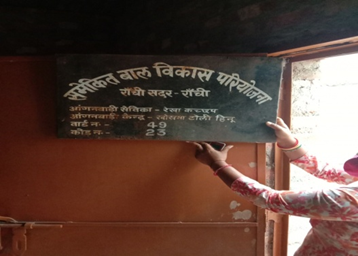
Anganwadi kendra at Kokhma toil in Ward 49
All the stakeholders during the survey had their grievances. From the beneficiaries’ point of view, it was found that both the anganwadis inspected had no washrooms for children nor any facility of drinking water. Most parents whose children came here said that water is drawn from wells to cook the food. Children are given water in bottles from homes but that is not sufficient. As there is no washroom, children go near the road to relieve themselves, which is not only unhygienic but also risky. There is a pressing need for better quality food.
Children always like to come to the anganwadi centre as they say that it not only helps them get elementary education, but food as well. Parents say that unlike at their homes, children eat more in groups. If they are given better quality food, it will have a positive impact on their health. The parents said that their children missed coming to the anganwadi during the pandemic.
The anganwadis inspected had no washrooms for children nor any facility of drinking water.
The anganwadi sewikas said that infrastructural resources available at anganwadi centres were scarce. The anganwadi centre at Bajra Nadi Tola in Hehal situated in Ward 34 was being run on rented premises. Ranjeeta Tirkey, the aganwadi sewika here, said that the government gives a petty allowance of merely ₹150 per month to defray the rent expenses, which is thoroughly insufficient, as no rooms can be procured at a rent of less than ₹1,500 to 2000.
Even the anganwadi centre at Khokhma Toli in Ward 49 is being run at the Samudayik Bhawan. Rekha Kashyap, the sewika here, suggested that anganwadis be constructed on the lines of the Indira Awas Yojana.
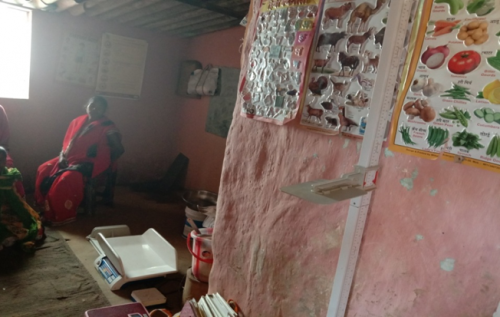
Anganwadi kendra at Bajra Nadi Tola in Ward 34
There was a lack of funds for fuel and transportation. Cooking gas was available at both the anganwadi centres inspected, but cylinders to use them were missing. The sewikas said that they prepare the food on firewood and coal, which not only has to be purchased at a higher rate than what they are given for it, but additional transportation expenses for bringing thse fuels have to also be borne by the sewikas.
The lady supervisor reported irregularity in receiving the amount of ‘take-home ration’ (THR). The THR for lactating and pregnant women is not received on a regular basis. This often invites complaints from the beneficiaries, who lose hope after they do not receive it for two to three months at a stretch.
An objective of the ICDS is to develop the habit of providing nutritious food to pregnant and lactating women. Once they stop receiving the THR, one cannot expect them to continue with it as they are unable to purchase such food on their own.
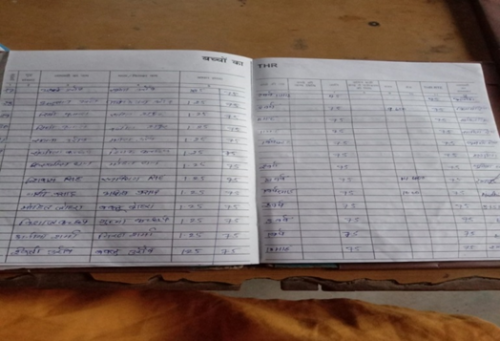
Register of THR at an anganwadi kendra of Khokhma Toli in Ward 34
Separate buildings for anganwadi centres must be built. There should be uniforms for children coming to anganwadis, and the children must be provided with school bags. Toilets must be constructed for children at the anganwadis, and adequate arrangements must be made for drinking water. The vigilance committee must prepare a health report of all malnourished children and women in its jurisdiction. Model anganwadi centres must be developed for replication.
India’s aspiration of cashing in on its demographic dividend would be thwarted if the focus doesn’t shift from accumulating numbers and targets to providing for proper psychological, physical and social development of its human capital.
India’s aspiration of cashing in on its demographic dividend would be thwarted if the focus doesn’t shift from accumulating numbers and targets to providing for proper psychological, physical and social development of its human capital. The achievement of this goal is only possible through a holistic support by way of cash incentives and the promotion of health-seeking behaviour.
As per the NFSA, the provision of food and nutritional security by ensuring adequate access to quality food to live a life with dignity has been the main focus of the government. However, the realisation of this vision continues to be a challenge on the ground. Only a fool-proof mechanism which involves the participation of all stakeholders can achieve the objective of building a nation consisting of healthy human resources.
Dr Shalini Saboo is an assistant professor of law at the Institute of Legal Studies, Ranchi University.
Get the latest reports & analysis with people's perspective on Protests, movements & deep analytical videos, discussions of the current affairs in your Telegram app. Subscribe to NewsClick's Telegram channel & get Real-Time updates on stories, as they get published on our website.









